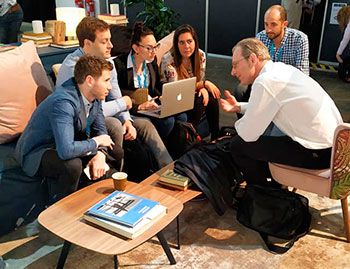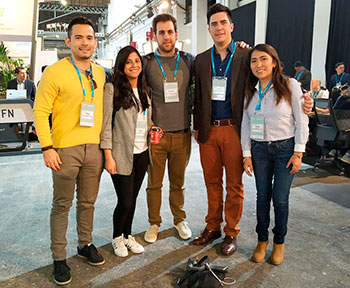MBA participants at the Barcelona Mobile World Congress
 This week, the EADA’s International MBA participants face a new challenge: they will immerse themselves in the world of the latest technologies and innovation by attending two of the largest international events in Barcelona: 4YFN and the Mobile World Congress. 4YFN (4 Years From Now) is one of the most important startup events in Europe, connecting startup communities and mobile consumers from around the world. The Mobile World Congress (MWC) is the world’s largest exhibition for the telecommunications industry, with prominent executives representing mobile operations, device manufacturers, technology providers, vendors and content owners on a global level.
This week, the EADA’s International MBA participants face a new challenge: they will immerse themselves in the world of the latest technologies and innovation by attending two of the largest international events in Barcelona: 4YFN and the Mobile World Congress. 4YFN (4 Years From Now) is one of the most important startup events in Europe, connecting startup communities and mobile consumers from around the world. The Mobile World Congress (MWC) is the world’s largest exhibition for the telecommunications industry, with prominent executives representing mobile operations, device manufacturers, technology providers, vendors and content owners on a global level.
EADA participants will visit both leading trade show exhibitions as part of the new course “Exploring the future at 4YFN and MWC” beginning this week. This subject immerses students in the future of technology to understand how startups and established tech companies will create change across sectors.
According to Course Director Bart Huiskein, throughout the course, participants “learn soft skills such as how to create high-performing teams to complete a challenging assignment in a limited amount of time, how to leverage and make the best use of trade shows, how to deal with the ambiguity caused by the current pace of innovation in the market, and how to network with different levels of executives”. Apart from this, he adds that they will gain a better understanding of technological trends, the role of technologies in our future and the operation of startups.
The four stages of the course
 The course is structured in four phases. In phase one, students learn about disruptive innovation before identifying several technologies, trends and industry sectors that they are passionate about. After narrowing the scope to one or two focus areas, participants move on to the second stage: research. This phase leads them to the single topic of their project, and it is at this point that they begin to prepare for the in-depth interviews of stage three. The third phase is all about interviewing executives who are experts in the field to gain deeper insight into the focus area. In this phase, students learn from testing their hypotheses. The course culminates in phase four in a presentation where the students explain their journey, the key insights that they have learned and how they see the world differently as a result of the research.
The course is structured in four phases. In phase one, students learn about disruptive innovation before identifying several technologies, trends and industry sectors that they are passionate about. After narrowing the scope to one or two focus areas, participants move on to the second stage: research. This phase leads them to the single topic of their project, and it is at this point that they begin to prepare for the in-depth interviews of stage three. The third phase is all about interviewing executives who are experts in the field to gain deeper insight into the focus area. In this phase, students learn from testing their hypotheses. The course culminates in phase four in a presentation where the students explain their journey, the key insights that they have learned and how they see the world differently as a result of the research.
The course is designed to provide students with a clear added value. To Bart, the most important is their improved ability “to understand the changes that are coming in the next 5-10 years, which will allow them to make more strategic decisions”. He further highlights that participants “will be more valuable to potential employers or investors by having a broader understanding of the changes on the horizon and that they may be in a better position to select the sector where they want to build their career”.
In addition, participants will be evaluated on the team’s preparation for the visits to 4YFN and the MWC, the participation and overall effectiveness of their teams and the final presentation. Teams must demonstrate that they have developed a unique approach to understanding the tech industry, gained new insights that they can bring to the table and produce a high-quality presentation on their findings. All team assignments will also include a grading component based on team members’ ratings of their peers.
First impressions
Bart Huiskein believes that the course will have an immediate impact on participants. “Firstly, students learn about what future developments they are excited about, by being exposed to a wide variety of areas and interacting with founders and executives working directly on their topics of interest”. Secondly, he adds, “ideally both EADA students and the executives gain new insights –the students get more knowledgeable over time as they interview more people and become experts themselves”. Thirdly, “all teams will present to each other, so it is a tremendous opportunity for a collective learning”.
Bart also highlights “the opportunity to create a performing team in a small period of time, to gather knowledge quickly and network effectively”.
